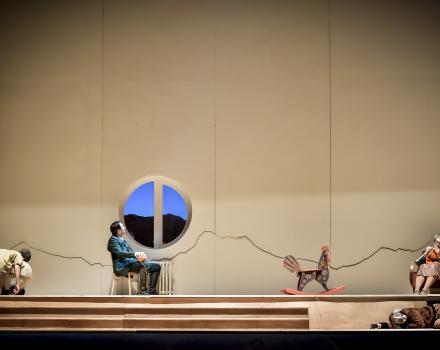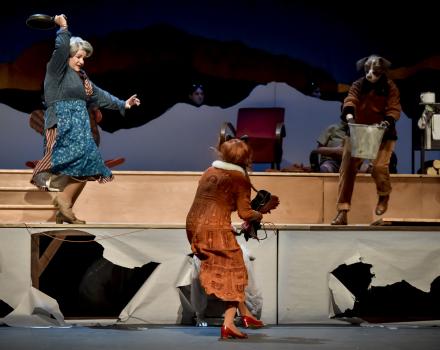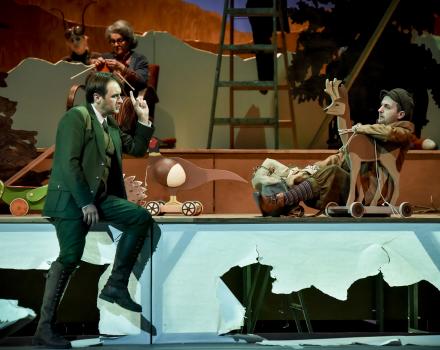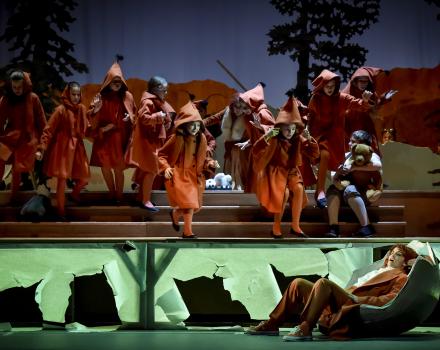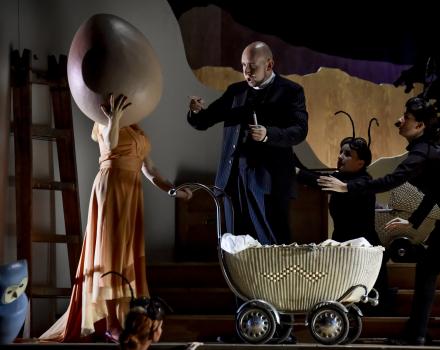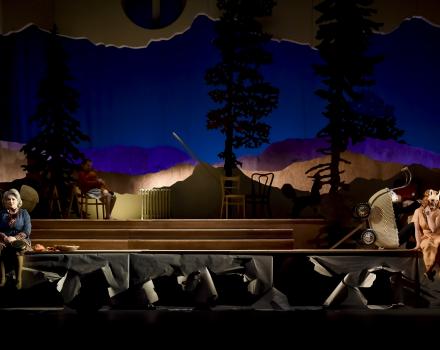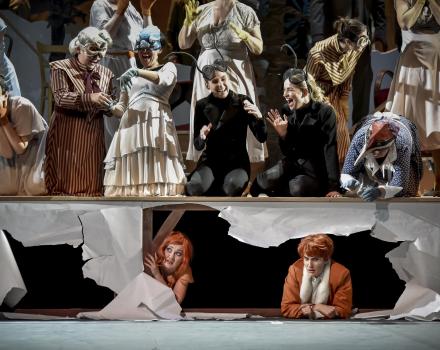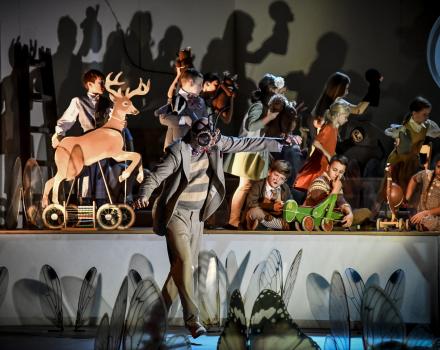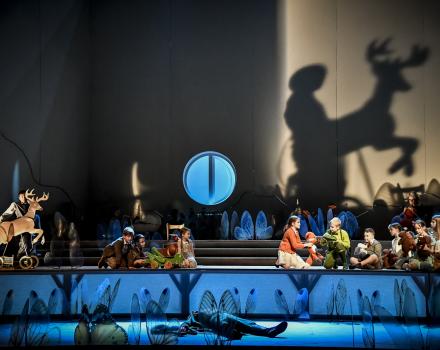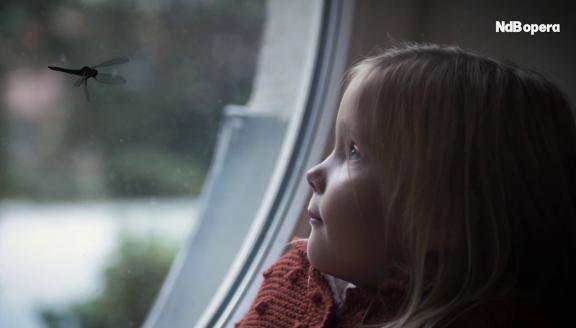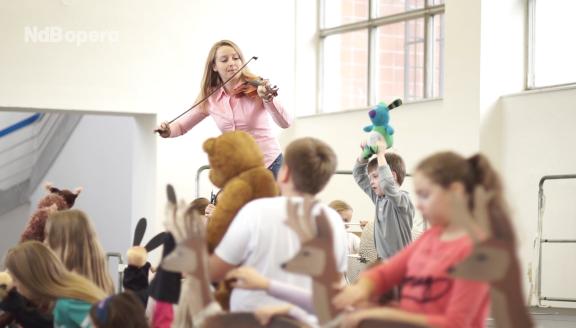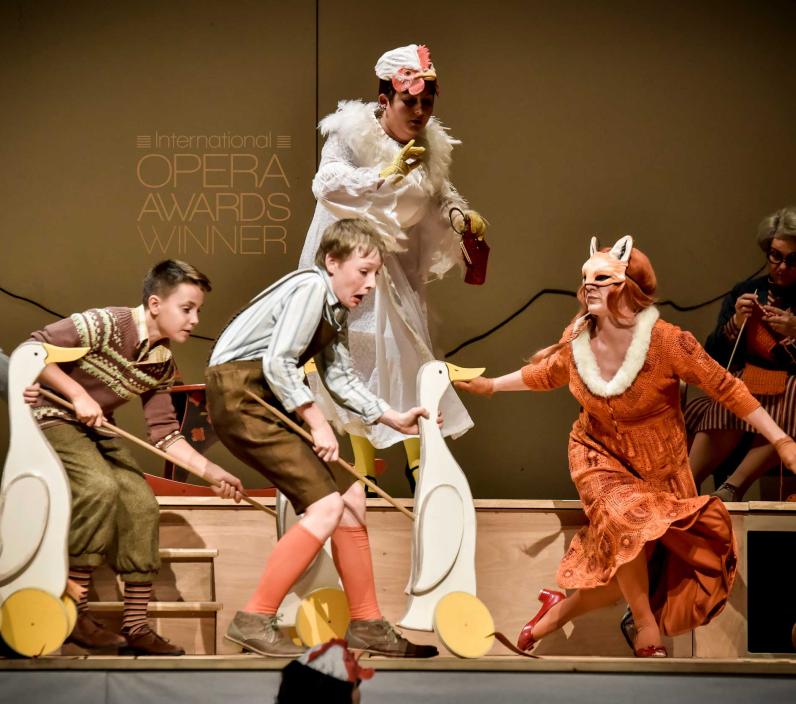

A little fox cub is captured by a forester. Growing up to be a strong and independent vixen, she escapes into the wild and learns about the eternal circle of life.
This production opened the last Janáček Brno International Opera and Music Festival which won the Festival of the Year Award at the 2019 International Opera Awards. It is directed by Jiří Heřman, Artistic Director of Opera at the National Theatre Brno.
Cast
Sharp-Ears the Vixen | Jana Šrejma Kačirková |
|---|---|
Little Sharp-Ears | Julie Šebestová |
Golden-Back the Fox | Václava Krejči Housková |
Forester | Svatopluk Sem |
Schoolmaster / Mosquito | Ondřej Koplík |
Priest / Badger | Jan Šťáva |
Forester's Wife | Daniel Straková-Šedrlová |
Pásek the Innkeeper | Petr Karas |
Pásková the Innkeeper's Wife / Woodpecker | Jitka Zerhauová |
Pepík | Zdislava Bočková |
Frantík | Eva Štěrbová |
Harašta | Roman Hoza |
Grasshopper | Zdislava Bočková |
Cricket | Eva Štěrbová |
Little Frog | Petr Hrůša |
Lapák | Jitka Klečanská |
Cock | Andrea Široká |
Chocholka the Hen / Owl | Martina Mádlová |
Jay | Andrea Široká |
Chorus | Choir of Janáček Opera National Theatre Brno, Brno Childen's Choir |
Orchestra | Orchestra of Janáček Opera National Theatre Brno |
| ... | |
Music | Leoš Janáček |
|---|---|
Conductor | Marko Ivanović |
Director | Jiří Heřman |
Sets | Dragan Stojčevski |
Lighting | Daniel Tesař |
Costumes | Alexandra Grusková |
Text | Leoš Janáček |
Chorus Master | Klára Svožilová Roztočilová |
Assistant Stage Director | Silvie Adamová |
| ... | |
Video
The story
Act I
Tempted by some warm moss, a forester has fallen asleep in the woods. A little fox cub sets off to investigate the forest, for there are so many strange things out there to discover. A tiny green frog wakes up the sleeping forester, who catches the little fox cub. She calls out for her mother, but the forester is already carrying her back to his lodge.
The little fox cub has grown up to become the vixen Sharp-Ears. She lives in the courtyard together with the dog Lapák, a flock of hens and a cockerel. It is springtime and Lapák is dreaming of love, but to no avail. Sharp-Ears has no experience of love either, though she still remembers what went on in the starling’s nest above her old den. When the forester’s son Pepík shows off to Frantík by poking Sharp-Ears with a stick, the vixen bites him in the leg. A fox is no dog, after all. The forester’s wife makes a scene and Sharp-Ears has to be tied up. The hens are happy – no more being chased around the courtyard, and the vixen has got its just deserts.
Sharp-Ears makes a revolutionary speech, appealing to the hens to overthrow the cockerel’s rule. When that doesn’t work, she pretends to be dead. Nudged into action by the hens, the cockerel goes to check if the vixen has really passed away. One bite later, and the cockerel’s head is in the vixen’s mouth. But why stop at one cockerel when there are so many tasty hens around? The forester’s wife hurries to the yard to find out what all the fuss is about and nearly has a heart attack when she sees the chaotic scene. She yells out to her husband to shoot the vixen but Sharp-Ears is too quick and disappears into the forest.
Act II
Sharp-Ears has found freedom among the trees, but she also needs somewhere to live. Without hesitation, she expels a grumpy old badger from his den, much to the amusement of the other woodland animals.
The forester, a pastor and a schoolmaster drink at Mr Pásek’s pub. The forester teases the schoolmaster for being too scared to proclaim his feelings for his secret love. In reply, the forester is asked a biting question as to how he’s getting on with that vixen he brought home. He growls that she ran away and that he won’t be looking for her. Inebriated, the schoolmaster gets up to go. The pastor follows him, for he has to pack to leave for another parish. The forester would love to tarry a while longer in the company of his old friends, but when his attempts to convince them to stay fall on deaf ears he also heads for home through the forest.
The drunken schoolmaster weaves his way home thinking about his beloved Terynka and stumbles after an apparition. The mind of the pastor, who is also well in his cups, is invaded by thoughts of how a lost love once hurt him. She was beautiful, eyes as deep as a well, and so all the worse was her betrayal. Both schoolmaster and pastor fall asleep in the quiet of the forest. The forester is also there, and when he catches a glimpse of the vixen, he decides to take a pot shot at her. The only thing he almost manages to hit is the terrified schoolmaster, who rushes to get out of the rifle’s range.
One night, in the glade where Sharp-Ears goes on her nightly wanders, who should appear but a fox named Gold-Spur. He’s a good-looking youth and the vixen can’t keep her eyes off him. They shyly get acquainted and Sharp-Ears tells him about her childhood at the forester’s lodge. Gold-Spur disappears, only to return quickly with a gift in the form of a rabbit. Sharp-Ears is bashful at first, but Gold-Spur’s sincere declaration of love wins her over.
The forest has a new scandal, and the owl’s eyes almost fell out when she was telling everyone. Sharp-Ears informs Gold-Spur that their love has not been without consequence – there’s nothing else for it but to go to see the pastor. The woodpecker marries the two foxes and the whole forest celebrates the wedding.
Act III
Summer dissolves into the colours of autumn, and these in turn vanish beneath a cloak of snow. But earlier than anyone anticipates, spring returns, and then another summer and autumn. The forester bumps into Harašta in the woods. He has a pack full of poultry but he swears he’s no poacher. The pair spot a dead hare lying in the clearing, and the forester uses it to set a trap for Sharp-Ears. Her family has been growing well and the parents have their hands full keeping an eye on their curious little offspring. The vixen doesn’t fail to spot the dead hare, but she also sees the metal trap that’s lying in wait for her. Harašta sees the vixen’s tail and wants to give it as a pretty gift to his bride-to-be. He grabs a stick and heads after the fox, but the woodland creatures get under his feet and Harašta ends up with a bump on his nose. The cubs take the opportunity to go through his pack of poultry with Sharp-Ears, but suddenly Harašta shoots her.
The patrons at the pub are not in a jolly mood. Pásek has gone to Brno and his wife complains that she has no time to chat with her guests. The pastor is missing, and the schoolmaster is down in the dumps because his secret love is getting married to someone else that very day. The friends part earlier than usual and the forester heads home through the forest once again. Everything reminds him of the day he found the vixen – and then he sees her, the spitting image of her mother. He tries to catch her but is foiled by a tiny green frog, the grandchild of the earlier one. It is as if life stopped for just a second, and a second lasted a whole lifetime. Such is the everlasting circle of life.
Insights
What does the fox say?
Patricie Částková, Dramaturg of the Janáček Opera at National Theater Brno, introduces the opera that's more closely connected with her city and its surroundings than any other.
Janáček’s seventh opera is always a challenge for those who stage it, as it connects two seemingly abstract worlds that each enchanted the composer: the world of opera with all the success and losses that came with his artistry; and the world of nature, to which he ran for refuge in his later age in search of silence.
The tale of the vixen was born in early 1920 with a series of paintings by the designer Stanislav Lolek, who took his inspiration from a true story about a tamed fox. The editors of the Brno daily newspaper Lidové noviny soon discovered the humorous pictures of animal life, and commissioned the writer Rudolf Těsnohlídek to create a narrative on the subject.
The series immediately became popular with the public and was made into a book. The Janáček household were regular readers of Lidové noviny and the composer became interested in the cartoons. During the summer holidays in 1921, he started sketching out the script for a new opera about the cunning vixen. He wrote the libretto by himself, which was based on ten of the original chapters from Těsnohlídek’s series.
Těsnohlídek´s narration ends with the wedding of Sharp-Ears and Gold-Spur. However, in contrast with the original story, Janáček decided to make a significant change and let the main character die. As a playwright, he felt that that a cheerful thing needed a dreadful ending to provide catharsis. He also reduced the number of human characters, deciding for the opera to emphasise the world of the animals.
Janáček was a highly idiomatic composer who liked to extract sounds from real life to use in his compositions. It was not only the melodies and rhythms present in human speech that interested him, but he was also keen on noting down everything he heard in nature. The preparations for The Cunning Little Vixen therefore had to include a thorough study of the life of foxes.
Janáček asked his friend from Hukvaldy, the landowner Ludvík Jung, to send him a report on when foxes reach adulthood, how many cubs they have, how long they are pregnant and how often they give birth. When staying in Hukvaldy, the composer often went to a forest with the local gamekeeper, Sládek, who had tracked down a fox’s den, and together they watched the frolicking cubs. Being sung by human beings, however, he ultimately treated the voice of the vixen and her family as human rather than imitating the sounds and calls of foxes.
Work began on the opera in earnest in January 1922. Two months later, Janáček wrote to his friend Kamila Stösslová: ‘I am already at work on The Cunning Little Vixen. I have no time to think about myself, and in no other year have I worked so hard as this.’ Revisions to the final act were not completed until October of the following year.
For the libretto, Janáček came up with several original ideas. In an entirely unique manner he confronted literary Czech with dialect that stemmed from Těsnohlídek’s text, which often serves as the basis for humour. He also used words from the folk songs ‘When I went a-wandering, music was playing’ ‘When I walked through the forest’, and composing his own versions. He took the children’s song ‘The fox is running to Tábor’ and put it into the mouths of the little fox cubs. Ballet and pantomime scenes are used to differentiate between animal and human perspectives, and between reality and dreams.
The premiere of The Cunning Little Vixen took place at the National Theatre Brno on 6th November 1924 and was conducted by František Neumann. The first director, Ota Zítek, based his work on the author’s concepts and for many years this predetermined the production traditions associated with the work. Abroad, the opera initially failed to find many followers, but that all changed with Walter Felsenstein’s famous production at the Komische Oper Berlin in 1956.
The Cunning Little Vixen is one of Janáček’s most lyrical and melodic works. Its beauty inspired the conductors Václav Talich and František Jílek to created orchestral suites from its musical material. It also sparkles with a humour while taking the listener on a philosophical journey round the eternal circle of life. To this day, no opera is so closely connected with Brno and its surroundings as The Cunning Little Vixen, which is why this new production directed by Jiří Heřman is the perfect start to this year’s Janáček Brno International Opera and Music Festival.
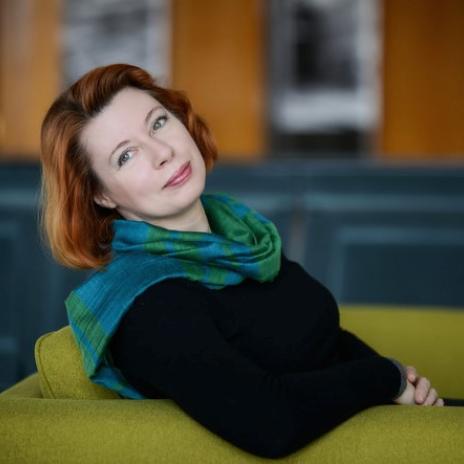
For two decades, Patricia Částková has been Dramaturg of the Janáček Opera at National Theater Brno. During that time she has worked on over seventy opera productions and with several internationally recognised directors, including Pamela Howard, Jiří Heřman and James Conway.
Patricia is a co-director of the Janáček Brno International Opera and Music Festival and a member of its dramaturgy board. She is also a regular collaborator with the musicology magazine Opus Musicum and was a founder of the non-profit chamber opera and education organisation Opera on the Move.
Gallery
